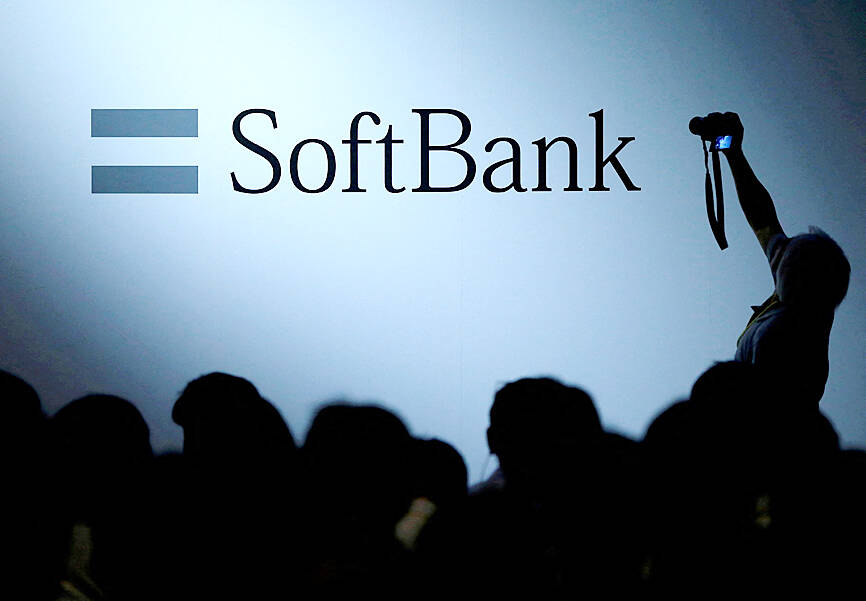Softbank Group Corp swung to its first profit after four straight quarters of losses, backed by a rebound in the value of Vision Fund’s public holdings and a windfall from T-Mobile US Inc shares.
The Tokyo-based technology investor reported a net income of ¥950 billion (US$6.4 billion) for the December quarter, reversing a ¥783 billion loss for the same period a year ago. It is the Japanese company’s first profit since September 2022, as it navigates volatile swings in the value of its start-up investments.
The Vision Fund unit reported a ¥422.74 billion gain for the period, up from a loss of ¥660.1 billion a year ago. DoorDash Inc, AutoStore Holdings Inc and Symbotic Inc were among the best performers contributing to the Vision Fund. The value of subsidiary Didi Global Inc’s (滴滴) shares also rose 22 percent in the over-the-counter market.

Photo: REUTERS
The solid quarter might herald more relief to come, Astris Advisory Japan analyst Kirk Boodrysaid. “We have not been overly bullish on the current portfolio, but the listing of key VF1 assets like ByteDance Ltd (字節跳動) or Fanatics Inc could provide some relief in 2024,” he wrote in a note ahead of the earnings, referring to Vision Fund’s investments in China’s TikTok owner and the US online sportswear and fan gear store.
Softbank booked an extra windfall from an arrangement to receive more than 48 million T-Mobile shares worth almost US$8 billion. The deal was part of an agreement struck when T-Mobile acquired rival and former Softbank unit Sprint Corp in 2020, designed to give Softbank more T-Mobile shares if the stock rose above a certain level during a given period.
A 40 percent rally in newly-listed chip design unit Arm Holdings PLC’s shares in the December quarter further bolstered Softbank’s finances. As the owner of about a 90 percent stake in the UK firm, Softbank would likely be able to use Arm to help finance loans for new investments, in the same way a stake in Alibaba Group Holding Ltd (阿里巴巴) helped Softbank secure financing to acquire Arm in the first place.
However, skepticism remains about the Vision Fund’s hundreds of privately-held start-ups. The second Vision Fund, funded entirely by Softbank, is mired in losses after a post-COVID-19 pandemic slump hurt tech valuations worldwide. The first Vision Fund has had its own share of losses, including from WeWork Inc, the start-up once valued as much as US$47 billion that filed for bankruptcy last year.

Taiwan Semiconductor Manufacturing Co (TSMC, 台積電) yesterday said that its investment plan in Arizona is going according to schedule, following a local media report claiming that the company is planning to break ground on its third wafer fab in the US in June. In a statement, TSMC said it does not comment on market speculation, but that its investments in Arizona are proceeding well. TSMC is investing more than US$65 billion in Arizona to build three advanced wafer fabs. The first one has started production using the 4-nanometer (nm) process, while the second one would start mass production using the

A TAIWAN DEAL: TSMC is in early talks to fully operate Intel’s US semiconductor factories in a deal first raised by Trump officials, but Intel’s interest is uncertain Broadcom Inc has had informal talks with its advisers about making a bid for Intel Corp’s chip-design and marketing business, the Wall Street Journal reported, citing people familiar with the matter. Nothing has been submitted to Intel and Broadcom could decide not to pursue a deal, according to the Journal. Bloomberg News earlier reported that Taiwan Semiconductor Manufacturing Co (TSMC, 台積電) is in early talks for a controlling stake in Intel’s factories at the request of officials at US President Donald Trump’s administration, as the president looks to boost US manufacturing and maintain the country’s leadership in critical technologies. Trump officials raised the

‘SILVER LINING’: Although the news caused TSMC to fall on the local market, an analyst said that as tariffs are not set to go into effect until April, there is still time for negotiations US President Donald Trump on Tuesday said that he would likely impose tariffs on semiconductor, automobile and pharmaceutical imports of about 25 percent, with an announcement coming as soon as April 2 in a move that would represent a dramatic widening of the US leader’s trade war. “I probably will tell you that on April 2, but it’ll be in the neighborhood of 25 percent,” Trump told reporters at his Mar-a-Lago club when asked about his plan for auto tariffs. Asked about similar levies on pharmaceutical drugs and semiconductors, the president said that “it’ll be 25 percent and higher, and it’ll

CHIP BOOM: Revenue for the semiconductor industry is set to reach US$1 trillion by 2032, opening up opportunities for the chip pacakging and testing company, it said ASE Technology Holding Co (日月光投控), the world’s largest provider of outsourced semiconductor assembly and test (OSAT) services, yesterday launched a new advanced manufacturing facility in Penang, Malaysia, aiming to meet growing demand for emerging technologies such as generative artificial intelligence (AI) applications. The US$300 million facility is a critical step in expanding ASE’s global footprint, offering an alternative for customers from the US, Europe, Japan, South Korea and China to assemble and test chips outside of Taiwan amid efforts to diversify supply chains. The plant, the company’s fifth in Malaysia, is part of a strategic expansion plan that would more than triple